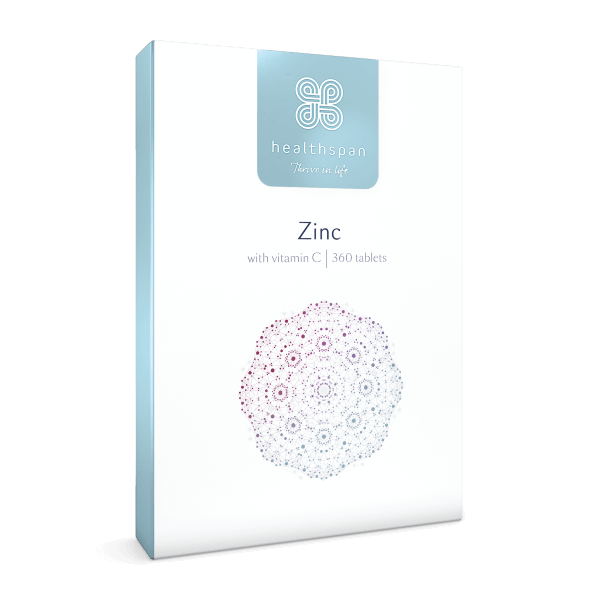Zinc doesn't get a lot of press, but it's incredibly important for the healthy functioning of many parts of the body – including the immune system.
There are multiple reasons why your body needs enough zinc. It's required for protein and DNA synthesis, healthy growth in childhood, fertility, and can also reduce the risk of age-related macular degeneration.1, 2, 3, 4, 5, 6, 7
Recently, zinc's importance has been extended to immune function. It is vital in assisting the immune system in its job of fighting off invading bacteria and viruses and is used to reduce symptoms of the common cold, especially a sore throat. Zinc also has protective effects against autoimmune conditions in which the body starts attacking healthy cells.8, 9 How exactly can this mineral help to fight autoimmunity, and how much do you need? Here, we take a closer look at zinc in relation to autoimmunity.
What does zinc do?
Zinc is needed to trigger the activation of infection-fighting T cells.10 These control and regulate immune responses and attack infected or unhealthy cells, helping to ward off infection and disease.11 T cell function is highly zinc-dependent and this mineral is needed for their transformation into either 'killer' cells or 'helper/memory' T cells (which help the immune system to 'remember' a given pathogen should it encounter it again).
Zinc also fights infection by subtly reigning in the immune response, to stop it spiralling out of control and causing excessive inflammation in the body.12 It's suggested this could explain why taking zinc supplements or lozenges at the onset of a cold appears to reduce its symptoms and duration. Zinc also helps to reduce the risk of infection in the elderly, whose immune responses are less efficient, and could play a role in reducing and treating some age-related and/or autoimmune diseases.13
What does a zinc deficiency look like?
If you're deficient in zinc, this can lead to skin conditions like acne or eczema, eye and skin lesions, slow wound healing, anaemia (by aggravating iron deficiency), diarrhoea and hair loss. Other symptoms include loss of appetite, food cravings for either very salty or very sweet foods, loss of taste sensation, an abnormal or metallic taste in your mouth, and changes to your cognitive health (like impaired memory).14
Chronic (long-term) zinc deficiency can increase production of pro-inflammatory cytokines (chemical messengers in the immune system) and this is implicated in a number of chronic inflammatory and autoimmune conditions including rheumatoid arthritis, multiple sclerosis and type 1 diabetes.15, 16, 17
You can also be at risk of low zinc status as a result of excessive drinking and chronic illnesses, and conditions in which the body has problems absorbing nutrients including gastrointestinal disorders (also linked to immune deficiency) like coeliac disease, Crohn's disease, and ulcerative colitis.18
How do you increase your zinc intake?
The best way to start upping your zinc intake is with food. Good sources of zinc include beans and pulses, meat, seafood, nuts, sunflower seeds, chickpeas, greens, dairy produce and fortified foods like some breakfast cereals. Typically, most of us get enough from our diet, though it can be difficult to do this if you're vegetarian (because of the low bioavailability or take up of this nutrient from plant-based sources), or an athlete (due to intense over-exercise, which increases losses in sweat).
On top of this, you might benefit from taking a daily zinc supplement. These come in a range of forms, including zinc acetate, zinc oxide, zinc citrate, sulphate, gluconate, picolinate, orotate, and chelated zinc. The picolinate and citrate forms have been found to have higher absorption rates.19 If you do opt for a zinc supplement, a typical dose is 15mg per day, based on the EU nutrient reference value for adults. What's more, the NHS warns against taking any more than 25mg daily, so be sure to keep to the recommended dosage.20

Zinc with Vitamin C
Easily absorbed zinc citrate for immunity, hair, nails, skin and vision
- Zinc citrate for easy absorption
- Supports immunity and multiple other health areas
- Support your health and wellbeing for less than €0.04 a day
The bottom line: getting more zinc
We need to regularly consume zinc as it's not naturally stored in the body. A recent report suggested taking just 4mg of extra zinc daily could have a significant effect on improving cellular health and helping to fight infections and disease.21 If you know your diet is not as good as it could be, your first step is to change the foods you eat and to include more zinc-rich meals, and also to consider a supplement.







